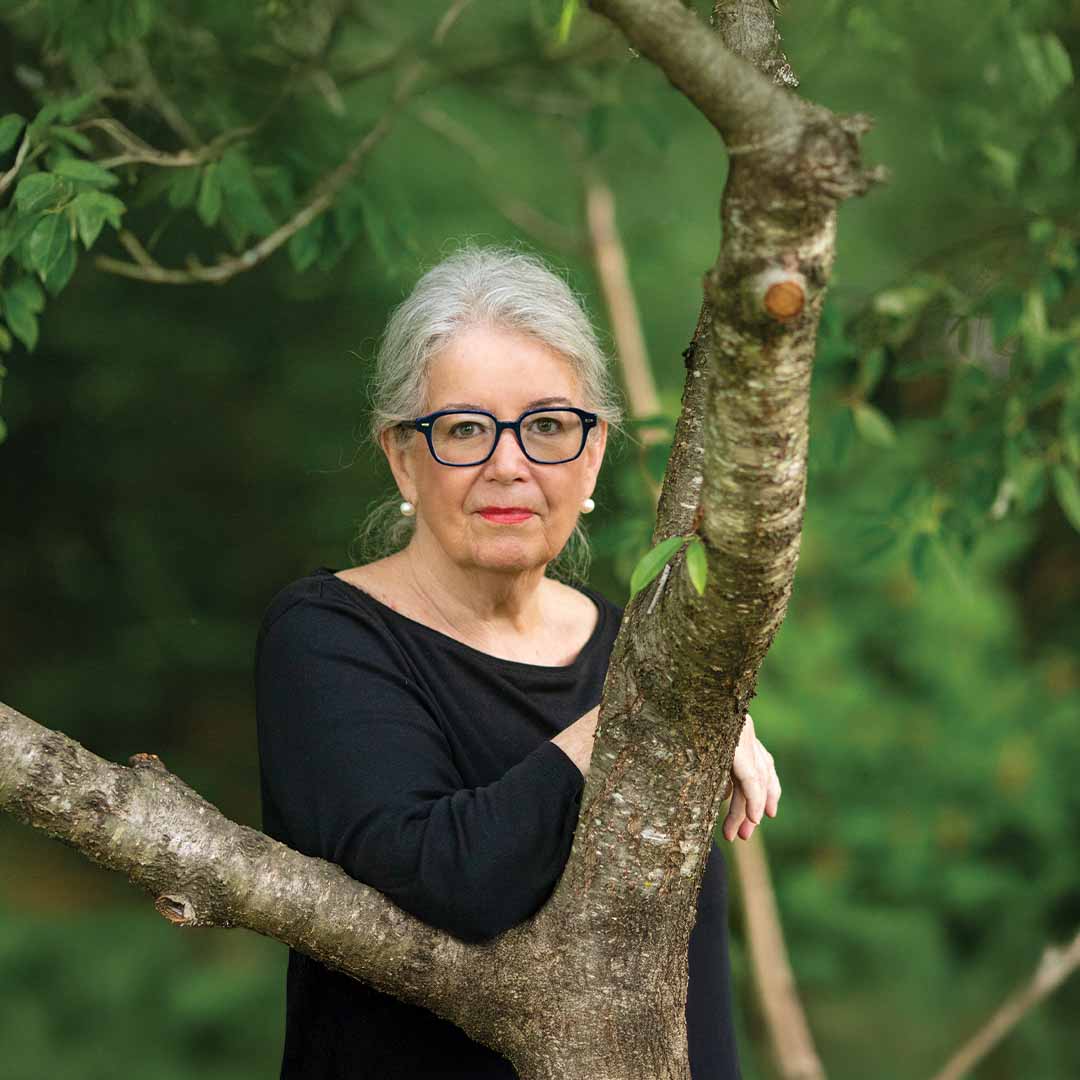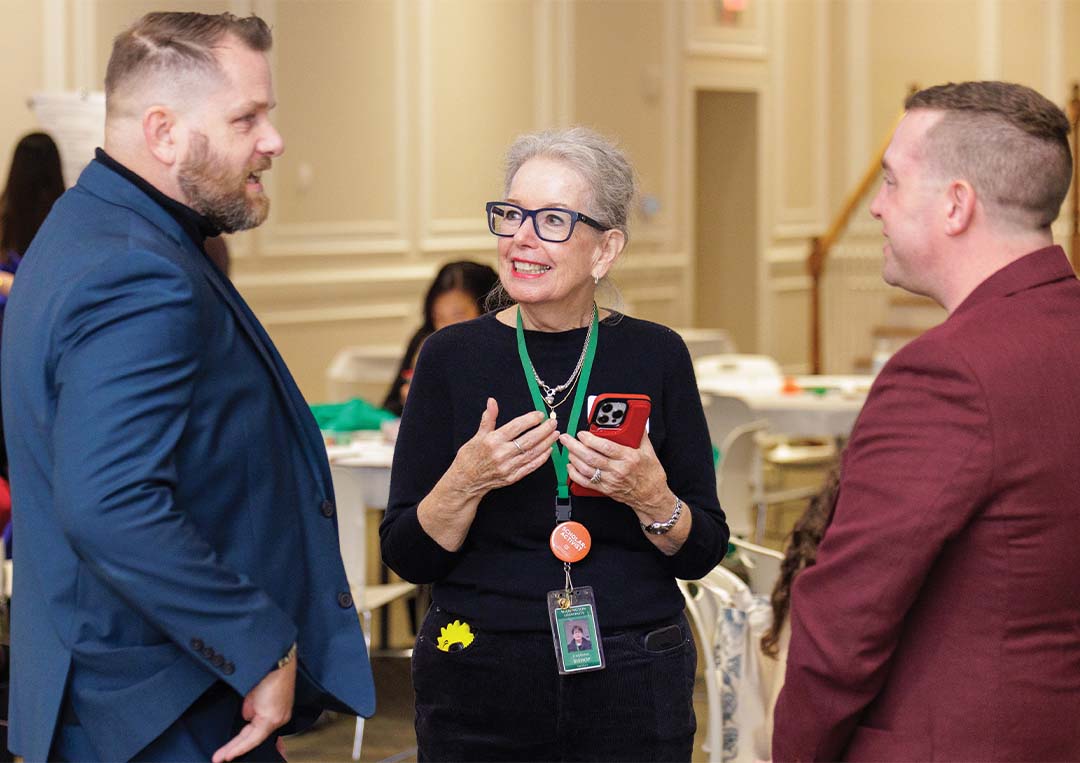Dr. Johanna Bishop Continues to ‘Make the Invisible Visible’

For almost a decade now, Dr. Johanna Bishop has been on a campaign to, as she calls it, “make the invisible visible.” By that, she means exposing the crime of human trafficking.
Dr. Bishop is an associate professor and director of WilmU’s Behavioral Science Programs, so her workdays are full. But since 2016, when she founded the University’s Human Trafficking Symposium, she has devoted untold hours to fighting an insidious barbarity that victimizes an estimated 27.6 million worldwide.
Traffickers prey on people of all ages, backgrounds, and nationalities, profiting by compelling them to perform labor or engage in commercial sex. As both a crime and a human rights abuse, it compromises national and economic security, undermines the rule of law, and harms the well-being of individuals and communities everywhere. Out of every 10 victims detected globally, five are adult women, and two are girls. Migrants account for a significant share of the detected victims in most regions because traffickers focus on the marginalized and impoverished.
Dr. Bishop’s initial Human Trafficking Symposium quickly gained momentum and became an annual event, and by 2020, during the pandemic, she introduced human trafficking webinars. Presented monthly during the academic year and available free to the public, the seminars are conducted by human service specialists, academics, law enforcement and legal professionals, nurses, survivors, and others. By the end of last year, Dr. Bishop had hosted 76 such online events, making WilmU a leader in human trafficking studies and awareness.
The webinars’ popularity has been growing, attracting attendees from dozens of states and several countries, with an average attendance of about 225. Registration and actual attendance can vary because all registrants receive a link to a webinar recording to watch at their convenience. Dr. Bishop says many ask for a certificate of attendance and use it for professional development.
Her passion for her cause has attracted an ever-growing list of compelling speakers to both the webinars and the symposium. Dr. Bishop is particularly gratified that there has been a growing number of male presenters. “Everyone is now starting to recognize that boys and men get abused, too,” she says.

She points out that the keynote speaker for last October’s conference was David Garlock, a formerly incarcerated criminal justice reform advocate and reentry expert. Garlock and his brother received 25-year sentences in Alabama after taking the life of their abuser. A client of the Equal Justice Initiative, Garlock was released on parole in 2013 after serving more than 13 years and pursuing educational opportunities while incarcerated. He subsequently earned a bachelor’s degree from Eastern University.
Another presenter at the conference was Dan Burke, WilmU men’s basketball coach and director of Student Concerns, whose subject was “Grooming Behavior in Athletics.”
“This became something big when Olympic gymnast Simone Biles and others went public with it happening in their sport,” says Dr. Bishop. “The audience loved what Dan had to say, so by popular request, we’re having him do this as a webinar.”
A recent addition to the schedule is Truckers Against Trafficking (TAT), a nonprofit organization formed in 2009 that trains truck drivers to recognize and report instances of human trafficking. Noting that truck stops are notorious for trafficking, Dr. Bishop says TAT “has helped to train the entire transportation industry, and we have had three presentations by them.”
That’s just one example of how awareness about human trafficking is spreading. “We’re developing expertise among many professions,” says Dr. Bishop. “Teachers and educators, for instance. There are kids in classrooms who their parents are trafficking for drug money. One of my speakers in 2022 was actually trafficked by her father, who was an alcoholic. It was a horrible childhood.” The speaker, Lockey Maisonneuve, authored a book about her experiences, “A Girl Raised by Wolves.”
Not surprisingly, knowledge about human trafficking has increased throughout WilmU. “I’m proud of how we are strengthening the infrastructure so that we have people in-house who have developed more capacity and more knowledge and have been able to train others,” says Dr. Bishop.
She points to Dr. Lisa Drews, WilmU professor and chair of the R.N. to B.S.N. & M.S.N. Leadership Programs, who has been educating nurses and healthcare professionals at Dr. Bishop’s conferences since 2016. She has developed a curricular module for the American Association of Colleges of Nursing focused on identifying, advocating, and caring for human trafficking victims.
Dr. Bishop, Dr. Drews, and others on the front line of this battle are facing daunting challenges. Despite increased international attention and resources from states and non-governmental institutions, the number of people falling victim to human trafficking around the world continues to grow.
“In the last 10 years, government agencies have looked at it much more seriously than they ever did before,” says Dr. Bishop. “But we’re not reducing the number because of several factors: technology, open borders, disasters and conflicts, and people having to move because of climate change. All of that is creating a situation where people are vulnerable and at risk for being trafficked.”
But she is far from discouraged. As she told this magazine in 2021: “It’s a heinous crime. You can’t ignore that and be a human being. You have to do what you can do. So that’s what we’re working on.”
— Bob Yearick
Want to read more in-depth stories? Explore our latest magazine articles.



